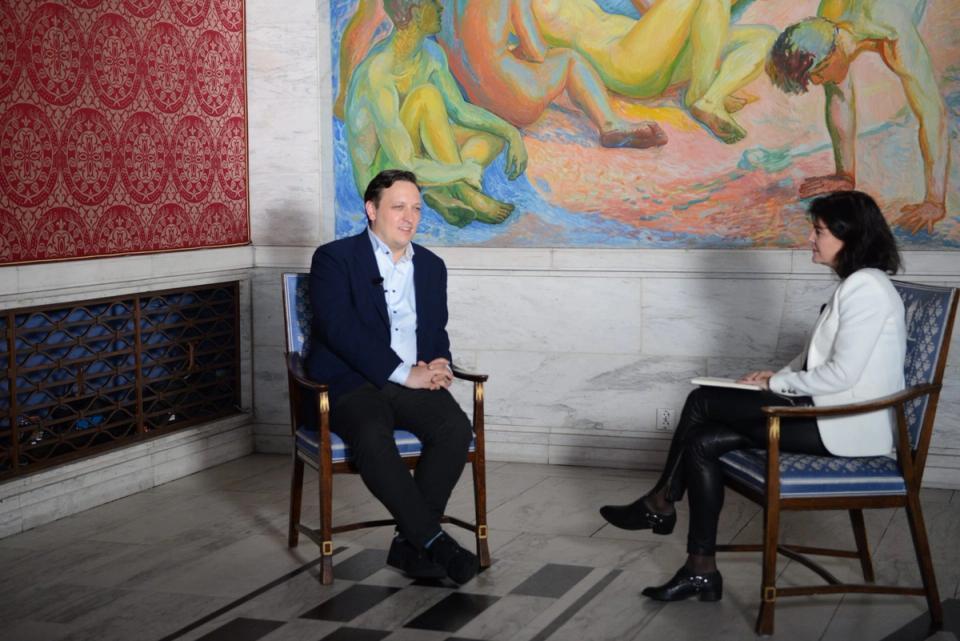11. november 2018
Interview with Ben Thompson

Tech analyst and founder of Stratechery, Ben Thompson, shares his insight on the future of media business in a conversation […]
Tech analyst and founder of Stratechery, Ben Thompson, shares his insight on the future of media business in a conversation with Kjersti Løken Stavrum, the CEO of the Tinius Trust.
You can listen to the recording of this conversation in the latest episode of the Tinius Talks podcast.
Stavrum: How come you manage to be so on top of this very complicated development of the media and technology businesses?
Thompson: There is a lot of power in the word why. Why would they do that? Is it a culture factor? Is it a business model factor? Is it the context they are competing in?
Stavrum: One thing that has puzzled me are the hearings in the US congress. Why wasn’t Google there, and why is there always some bad news from Facebook?
Thompson: When you are dealing with billions of people moving billions of pieces of content, and you want to get on them about how they police that content… I think the answer is that these problems are incredibly difficult.
Stavrum: Is it GDPR that is driving the change within Facebook?
Thompson: What I think has changed Facebook is bad PR. Especially around Cambridge Analytica. The reason why that matters is the reason why Facebook is powerful. It’s not because they are old school monopolies. It’s because that’s where users go to.
What Facebook is terrified of more than anything, is the idea that they become thought of as the digital equivalent of smoking or something. Where consumers sort of decide that this is a bad thing, and they stop going. That will limit them much more than a set of regulatory rules.
Stavrum: You think we should stop thinking of these companies as platforms, and treat them as aggregators. As far as I understand it, aggregators controls the access to the users?
Thompson: An aggregator is a company that gain some critical mass of users by being better. But once they have users, then the suppliers (content companies, whether it be newspapers, recipe sites or video sites) sort of attune themselves to the aggregator.
Google says make this format, they make that format. Google says do this, they do that. Google says jump, and they say how high?
Where it used to be economic power came from controlling supply, on the Internet it comes from controlling demand. Because it actually is possible to serve thousands of people. This the reality of there being zero marginal costs. There is zero cost on content. Zero cost on distribution. This leads to centralization.
Thomspon: These companies sit in the middle not because they are acting badly. They sit in the middle because it’s a more efficient way to distribute and discover information on the Internet. I say aggregators have the best user experience. And when I say user experience, I don’t mean user interface. What I mean is the totality of it. What is the most valuable messaging network? It’s the one that people are on. That matters more than the UI.
Stavrum: We have come there now that we are dealing with monopolists. How did we get there in the area of believing in the market forces, and for how long time will the politicians be watching these monopolists?
Thomspon: Well I mean, is it a monopoly? They love to say, “competition is just a click away”, and that’s actually true. The real sort of monopoly, if there is, is in the advertising market. From a regulator perspective, what I would think about is more how can we from an advertising side make sure that there is not too much consolidation. And what I also think is important from a regulator’s perspective is pushing transparency.
Stavrum: But it’s not very easy for journalists to dig into Facebook and find all these not so good stories?
Thompson: The power of journalism is greater than ever before. If you take the Napalm Girl’ Controversy that happened here in Norway. It was a story everywhere in the world, in a way that it would never happen before social media.
I think instead of fighting the internet, we need to ask: How can the Internet be harnessed to amplify things we want to happen?
Stavrum: Don’t fight the Internet is an interesting and motivating phrase. Why is it that it takes so long time for companies to acknowledge that?
Thompson: When I say, don’t fight the Internet, I’m talking in terms of business model. The challenge for newspapers is that they would brag about the division between advertising and editorial. But that wall is actually a major determent to figuring out the future.
Stavrum: But let’s jump to the core ethical questions then. Should there be more sponsoring of content?
Thompson: Not necessarily. If an editorial publication is desperate because they are not making money, that’s when ethical collapses happen. But it goes back to transparency.
I would rather have a sustainable company that is transparent than one that claims we are independent but is actually like a duck kicking desperately under water to stay afloat.
Stavrum: You are having success with the subscription model. Are subscriptions the final solution for the majority?
Thompson: I do think subscriptions are the answer, but I don’t know if it is the answer for the majority of newspapers around the world. Subscriptions align incentives in a powerful way. It’s no question that the journalist is writing in the interest of the reader, because the reader is the one paying for it. This can raise problems. I think you’ll end up seeing publications becoming more ideological because people are more motivated to support entities that support them ideologically.
Traditional newspapers are premised on advertisers reaching a huge audience, and their editorial goal is to reach as many people as possible. With subscriptions you focus on a niche. You want to go deeper as opposed to broader.
Stavrum: What will happen with the trademarks for media businesses?
Thompson: I do think newspapers that have that brand will pull it off, but I am concerned and wonder how more local newspapers or smaller entities will survive. Some people are always willing to pay. But what happens to the population that are not going to pay for news? That is a real question that I don’t have good answers to.
Stavrum: So, some will be left with the junk food on the news arena?
Thompson: I do worry about that. Figuring out what will be that mass market model for news will be interesting. Obviously, different countries have different approaches. The UK with the BBC is one approach, but that will never happen in the United States.
Stavrum: That’s so strange and separates you from many countries in Europe, actually.
Thompson: The US have tremendous skepticism of government interference. They trade that for large cooperations. It’s so deep in the American psyche.
Stavrum: We have to talk a little bit about voice enabling. How will the news media compete when they are only left with sound?
Thompson: When its voice, there is no physical product. It’s all about the back-end service. It’s about the integrations. If you think about what companies are good at, this is right in Googles wellhouse.
Stavrum: But i’ve heard you mentioned a few times that the winner takes it all. Or the first mover takes the market?
Thompson: The winner takes all matters most when there are strong network effects. For example, WhatsApp was the first and a free edition in lots of markets, and that’s the actual reason it succeeded. In the case of the home, is there a network effect? I don’t know yet. As far as media companies I don’t see clear network effects.
Stavrum: A final question now. Do you see a bright future for media diversity? Or do you think we should be concerned?
Thompson: Almost all media companies do need to change their business model going forward.
The business model need to be changed away from being advertising based to being reader supported. At least some sort of model that works with the Internet, as opposed to against the Internet.
I am obviously an example of a new sort of journalism that is uniquely enabled on the Internet. But is the future going to be all sort of one-people teams? I don’t think so. I do think figuring out how this scale to larger teams is something that will take time to figure out.
The future is going to favor specialist journalism. People are willing to pay, because it actually is different from all the sort of surface level stuff you get everywhere else.
Stavrum: But for those who charge money it burns down to trust and transparency?
Thompson: I don’t think trust comes from being an all-knowing oracle, like: we are the editors, and we say how it goes. That world is gone. Trust comes from: all my cards are on the table, this is where I’m coming from, these are the things you will know about, and this is what I think and why, and if I get it wrong, I will come back and tell you. It is a more authentic level of trust.
Stavrum: Thank you so much for coming, Ben Thompson.
Thompson: Thank you. I enjoyed the conversation.
Listen to Tinius Talks here, or in iTunes, Spotify, Soundcloud or on your preferred podcastapp.
Do you want more insight on the future of media business? Watch the video interview between Ben Thompson and Kjersti Løken Stavrum recorded at the Oslo City Hall, with even more in-depth questions and answers.
All pictures are credited: Hansine Korslien/The Tinius Trust.



